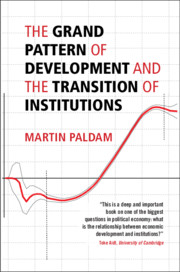
- Cited by 4
-
Cited byCrossref Citations
This Book has been cited by the following publications. This list is generated based on data provided by Crossref.
Paldam, Martin 2021. Handbook of Labor, Human Resources and Population Economics. p. 1.
Berggren, Niclas and Bjørnskov, Christian 2022. Political institutions and academic freedom: evidence from across the world. Public Choice, Vol. 190, Issue. 1-2, p. 205.
Paldam, Martin 2023. Meta‐mining: The political economy of meta‐analysis. Kyklos, Vol. 76, Issue. 1, p. 125.
Albert, James S. Carnaval, Ana C. Flantua, Suzette G. A. Lohmann, Lúcia G. Ribas, Camila C. Riff, Douglas Carrillo, Juan D. Fan, Ying Figueiredo, Jorge J. P. Guayasamin, Juan M. Hoorn, Carina de Melo, Gustavo H. Nascimento, Nathália Quesada, Carlos A. Ulloa Ulloa, Carmen Val, Pedro Arieira, Julia Encalada, Andrea C. and Nobre, Carlos A. 2023. Human impacts outpace natural processes in the Amazon. Science, Vol. 379, Issue. 6630,
- Publisher:
- Cambridge University Press
- Online publication date:
- August 2021
- Print publication year:
- 2021
- Online ISBN:
- 9781009025898
- Subjects:
- Economics, Economic Theory, Economic Development and Growth




